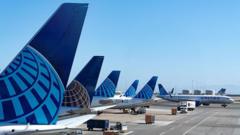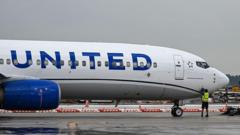A recent lawsuit against Delta and United Airlines highlights potential consumer deception regarding window seat designations.
Airlines Face Lawsuits Over 'Windowless Window Seats' Claims

Airlines Face Lawsuits Over 'Windowless Window Seats' Claims
Passengers allege Delta and United sold premium window seats that lack views.
In a striking legal development, Delta Air Lines and United Airlines are embroiled in lawsuits from passengers claiming they were misled into purchasing 'window seats' that turn out to be devoid of actual windows. The legal actions, filed independently against the airlines, allege that more than a million customers have been affected, seeking substantial damages in the process.
Passengers assert that they were charged premium prices for these window seats, only to find themselves next to blank walls, a situation not disclosed during the booking process. The claims specifically point to a number of aircraft models from Boeing and Airbus that feature windowless seats due to the arrangement of air conditioning ducts and other internal components.
The lawsuits, which have been reviewed by multiple sources, claim that both airlines fail to provide adequate notice regarding the windowless seat situation, thereby engaging in deceptive practices. Passengers typically opt for window seats for reasons ranging from personal comfort, such as fear of flying or motion sickness, to wanting scenic views. Legal representatives argue that many customers would have chosen differently had they been aware of the seats’ true nature, calling the airlines' actions "unlawful."
While representatives for United Airlines have refrained from commenting due to ongoing litigation, Delta's response remains pending. The complaints further suggest that other airlines, such as American Airlines and Alaska Airlines, manage transparency more effectively by notifying passengers about seat designs that may lack windows during the booking process.
Critics argue that the industry standard should ensure consumers receive clear and accurate information while reserving seats. As such claims unfold, the scrutiny regarding customer rights in air travel continues to grow, raising important questions about how airlines categorize and price their seating options.
Passengers assert that they were charged premium prices for these window seats, only to find themselves next to blank walls, a situation not disclosed during the booking process. The claims specifically point to a number of aircraft models from Boeing and Airbus that feature windowless seats due to the arrangement of air conditioning ducts and other internal components.
The lawsuits, which have been reviewed by multiple sources, claim that both airlines fail to provide adequate notice regarding the windowless seat situation, thereby engaging in deceptive practices. Passengers typically opt for window seats for reasons ranging from personal comfort, such as fear of flying or motion sickness, to wanting scenic views. Legal representatives argue that many customers would have chosen differently had they been aware of the seats’ true nature, calling the airlines' actions "unlawful."
While representatives for United Airlines have refrained from commenting due to ongoing litigation, Delta's response remains pending. The complaints further suggest that other airlines, such as American Airlines and Alaska Airlines, manage transparency more effectively by notifying passengers about seat designs that may lack windows during the booking process.
Critics argue that the industry standard should ensure consumers receive clear and accurate information while reserving seats. As such claims unfold, the scrutiny regarding customer rights in air travel continues to grow, raising important questions about how airlines categorize and price their seating options.



















